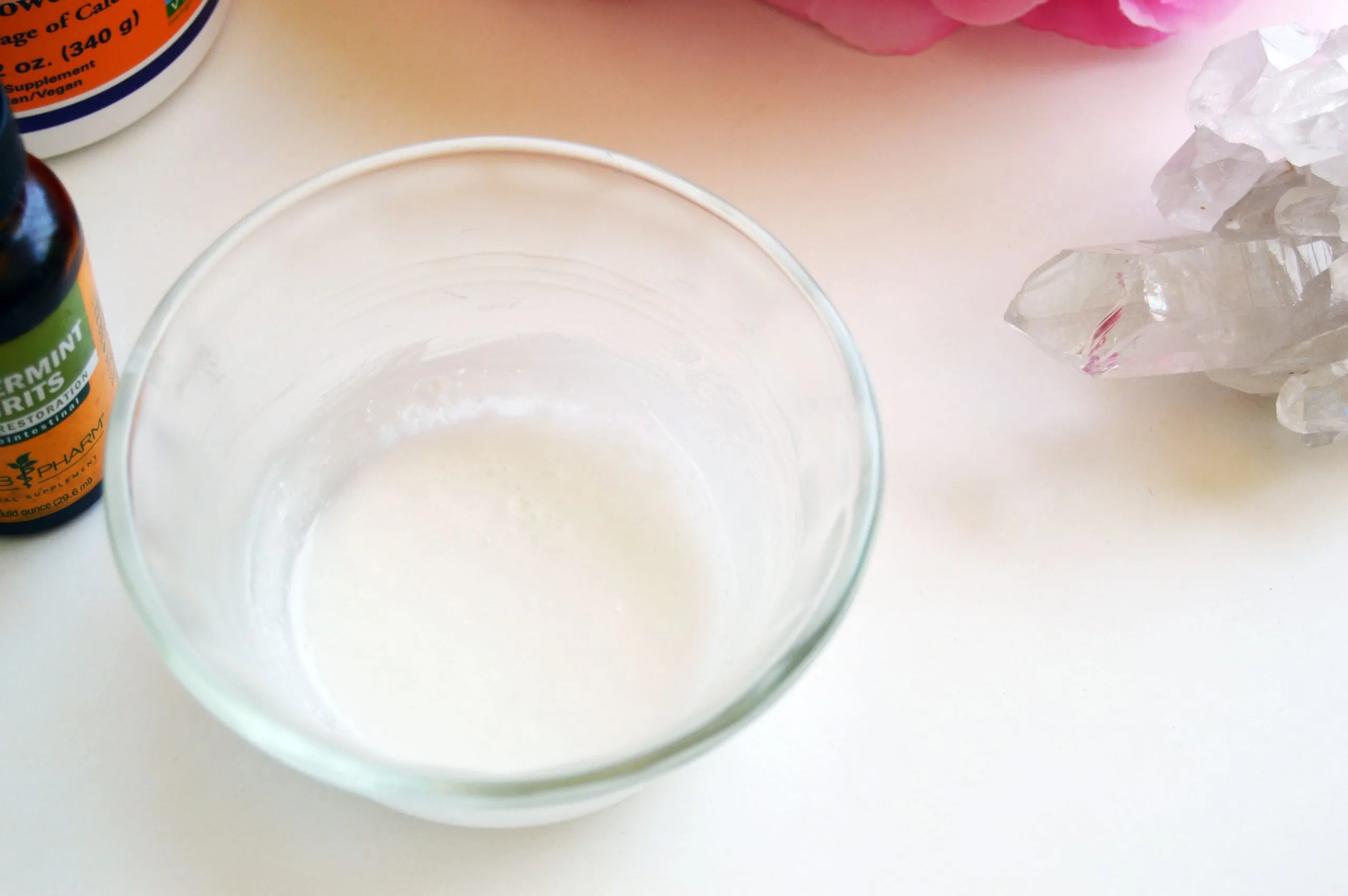Why Essential Oils for Teeth Whitening
The quest for a brighter, whiter smile has led many to explore natural alternatives to conventional teeth whitening methods. Essential oils, derived from plants, have gained popularity for their potential to improve oral hygiene and cosmetic appearance. Unlike harsh chemical treatments, essential oils offer a gentler approach, harnessing the power of nature to address teeth discoloration and promote overall oral health. Their natural properties, including antibacterial and anti-inflammatory benefits, make them an appealing option for those seeking a holistic approach to dental care. The use of essential oils aligns with a growing trend towards natural and sustainable living, encouraging people to explore alternative remedies for various health concerns. Essential oils can be easily incorporated into your daily routine, offering a convenient and potentially effective way to enhance your smile.
Benefits of Using Essential Oils
Essential oils offer a range of benefits beyond just whitening teeth. Many possess potent antibacterial properties, helping to eliminate harmful bacteria in the mouth that cause cavities and gum disease. Some essential oils have anti-inflammatory effects, which can soothe irritated gums and reduce swelling. Using essential oils can freshen breath naturally, providing a long-lasting feeling of cleanliness. Unlike some commercial teeth whitening products, essential oils often have a milder impact on tooth enamel, reducing the risk of sensitivity. The use of essential oils can complement your existing oral hygiene routine, contributing to a healthier and more radiant smile. The holistic approach of essential oils appeals to those seeking natural ways to maintain their oral health while avoiding harsh chemicals.
The Top 7 Essential Oils for Teeth Whitening
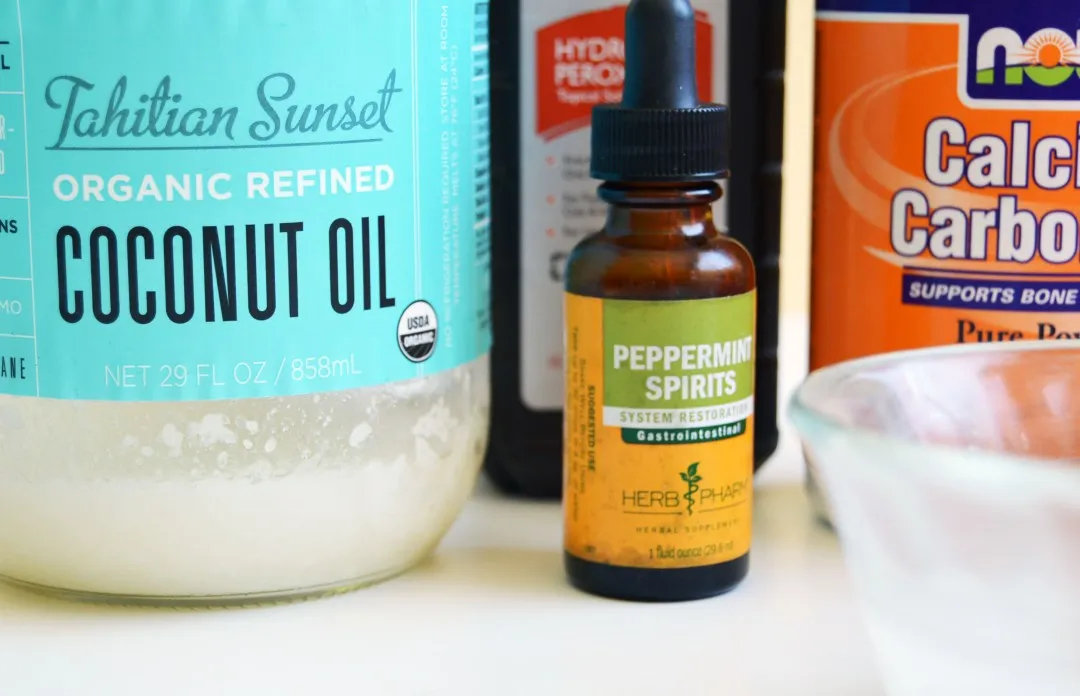
Several essential oils have shown promise in teeth whitening and oral health. These oils contain unique properties that contribute to their effectiveness in combating discoloration and promoting a brighter smile. Each oil offers distinct benefits, providing a versatile approach to oral care. Selecting the right combination of essential oils can maximize the whitening effect while also supporting overall oral health. Always research and understand each oil before use to ensure it aligns with your individual needs and sensitivities. The following list highlights seven essential oils that are often recommended for teeth whitening, with a brief overview of their potential advantages.
Lemon Essential Oil
Lemon essential oil is known for its natural bleaching properties, making it an excellent choice for teeth whitening. The high citric acid content helps to break down stains and brighten teeth. Lemon oil can also provide antibacterial action, helping to eliminate bacteria and promote a healthy mouth. Be cautious, as lemon oil can be acidic, which may cause sensitivity if used excessively or undiluted. Dilute it properly and use it in moderation to mitigate potential risks and maximize its whitening potential. Its refreshing scent can also freshen breath and provide a pleasant oral care experience. When used correctly, lemon essential oil can be a valuable tool for achieving a brighter, whiter smile naturally.
Peppermint Essential Oil
Peppermint essential oil is renowned for its refreshing qualities and is widely used in oral care products. The oil is a natural antibacterial agent, combating harmful bacteria in the mouth. Peppermint oil can leave your mouth feeling clean and refreshed. It can help to reduce inflammation and soothe irritated gums, contributing to overall oral health. The refreshing taste masks other strong flavors and adds a pleasant sensory experience. Regularly using peppermint oil can contribute to fresher breath and a healthier mouth. Ensure the oil is food-grade quality for oral use, and dilute it properly to prevent irritation.
Tea Tree Essential Oil
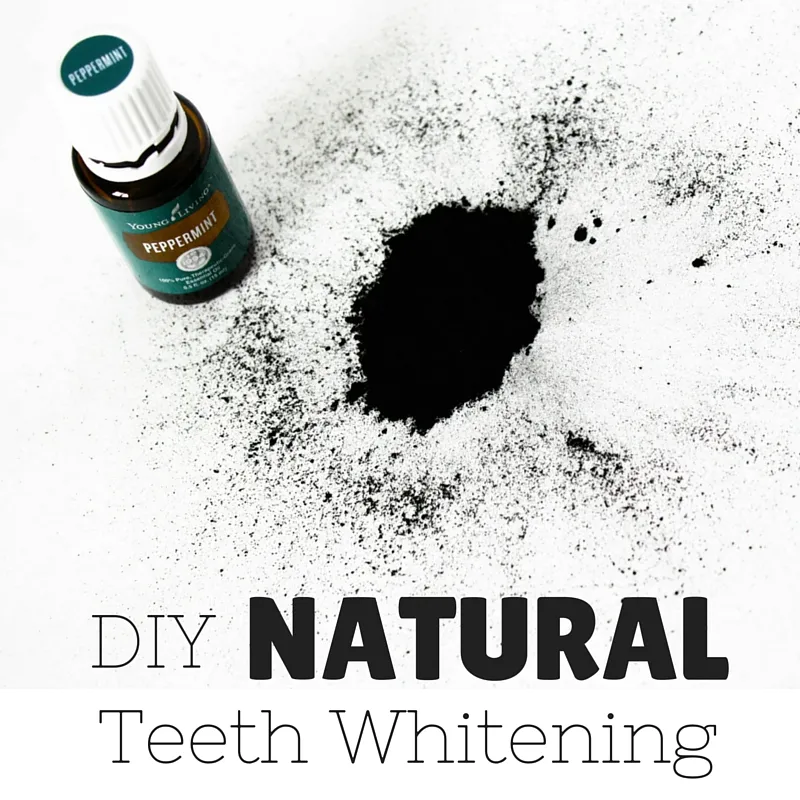
Tea tree essential oil is a potent antibacterial and antifungal agent, often used in oral hygiene. The oil can help eliminate bacteria that cause plaque, gingivitis, and bad breath. It has anti-inflammatory properties and can promote the healing of mouth sores or irritated gums. Tea tree oil should be used with caution because it is very strong and can be irritating if not diluted properly. It is important to dilute tea tree oil properly and to avoid swallowing it, as it is toxic if ingested. Due to its strength, it should be used in moderation and always mixed with a carrier oil before application to your teeth or gums. Despite its potency, when used correctly, tea tree oil can be a beneficial addition to your oral hygiene routine.
Orange Essential Oil
Orange essential oil, with its uplifting scent and natural bleaching abilities, is a pleasant option for teeth whitening. The limonene in orange oil helps to dissolve stains and brighten teeth. The oil also has antibacterial properties that can combat bacteria and promote oral hygiene. Its pleasant flavor offers a fresh and enjoyable oral care experience. Like lemon oil, orange oil is acidic and should be used with caution and proper dilution to avoid tooth sensitivity. It is crucial to use food-grade quality orange oil to avoid potential adverse reactions. Incorporating orange essential oil can be a delicious and effective way to support teeth whitening and improve oral health.
Frankincense Essential Oil
Frankincense essential oil, known for its anti-inflammatory properties, can support oral health by reducing gum inflammation. The oil is thought to promote the healing of mouth sores and improve gum health. Although it may not directly whiten teeth, it can contribute to a healthier oral environment, which is essential for maintaining a bright smile. Frankincense essential oil can be added to oral care routines as a component of a complete approach to oral health. Its ability to soothe inflamed gums and support overall dental health makes it a valuable asset. When used in combination with other essential oils, frankincense can contribute to a comprehensive approach to oral care and a radiant smile.
Myrrh Essential Oil
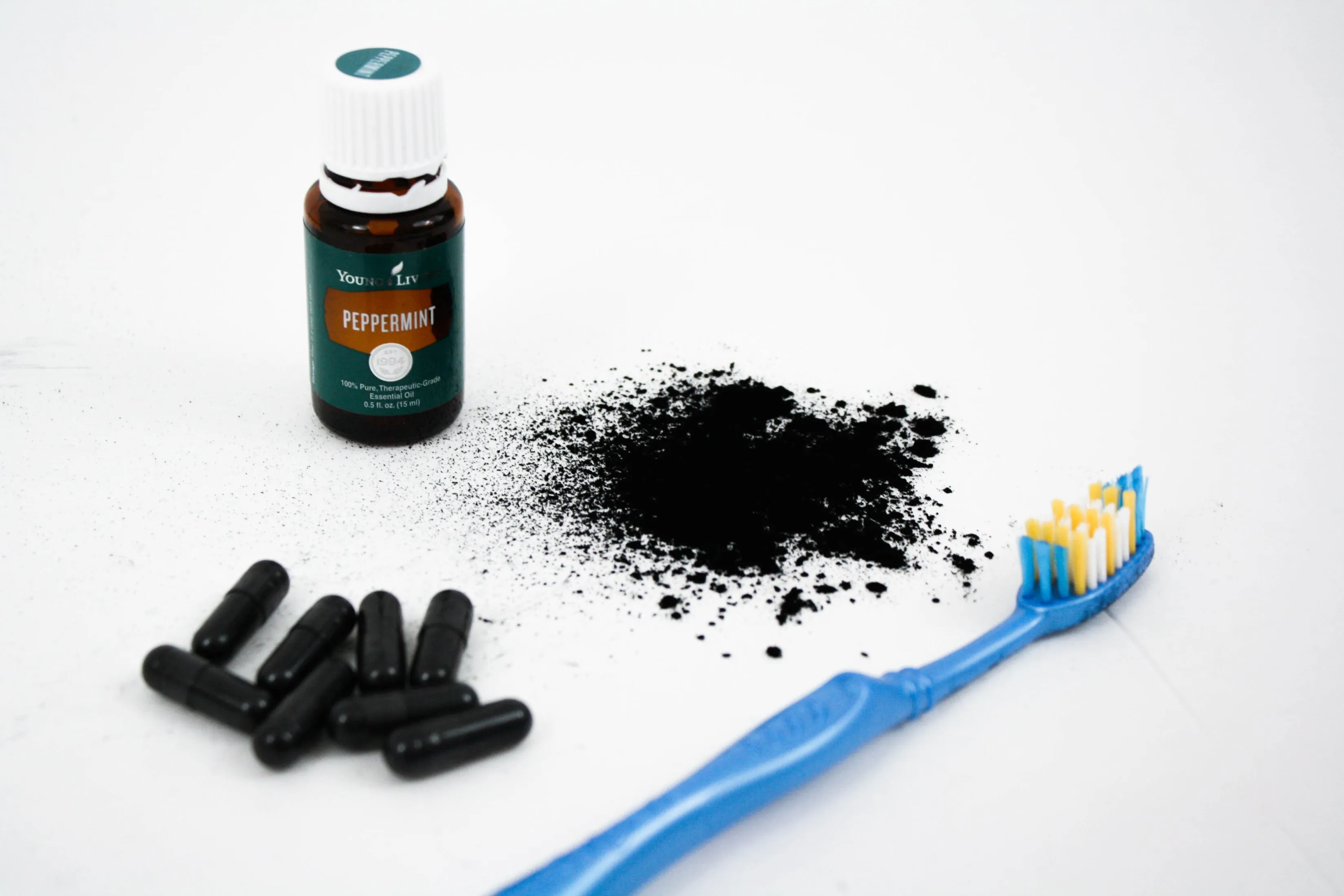
Myrrh essential oil, like frankincense, has powerful anti-inflammatory properties that can support healthy gums and overall oral wellness. The oil can aid in reducing inflammation and promote the healing of oral tissues. Myrrh’s antiseptic qualities can help to eliminate bacteria, which is vital for the prevention of gum disease. Although not specifically a whitening agent, myrrh can contribute to overall oral health, making it an excellent component of an oral care routine. Using myrrh in conjunction with other oils can boost the effectiveness of your oral care regimen. Diluted myrrh essential oil can play a significant role in promoting good oral health and contribute to a confident smile.
Clove Essential Oil
Clove essential oil has long been used for dental care due to its potent antiseptic and analgesic properties. Clove oil can help relieve toothaches and fight infections, promoting oral health. The oil also has antibacterial and anti-inflammatory effects, contributing to gum health. Be cautious when using clove oil, as it is highly concentrated and may cause irritation if used undiluted. It is essential to dilute it correctly and apply it carefully, especially to sensitive areas. Although it doesn’t directly whiten teeth, clove oil supports oral health by fighting infections and soothing discomfort. Incorporating clove essential oil, with proper precautions, into your oral care routine can aid in maintaining overall dental health.
Creating Your Teeth Whitening Recipe
Creating your own teeth whitening recipe allows you to tailor the ingredients to your needs and preferences. A homemade recipe offers control over the ingredients and allows you to avoid unwanted additives. It’s essential to research and understand the essential oils you intend to use. Always choose high-quality, therapeutic-grade essential oils from a reputable source. The recipe should combine essential oils with a carrier oil and, optionally, a mild abrasive to remove stains. Creating a safe and effective recipe involves understanding the properties of each ingredient and the importance of proper dilution. Preparing your teeth whitening recipe provides a customized and natural approach to oral care, empowering you to achieve a brighter, healthier smile.
Ingredients You’ll Need
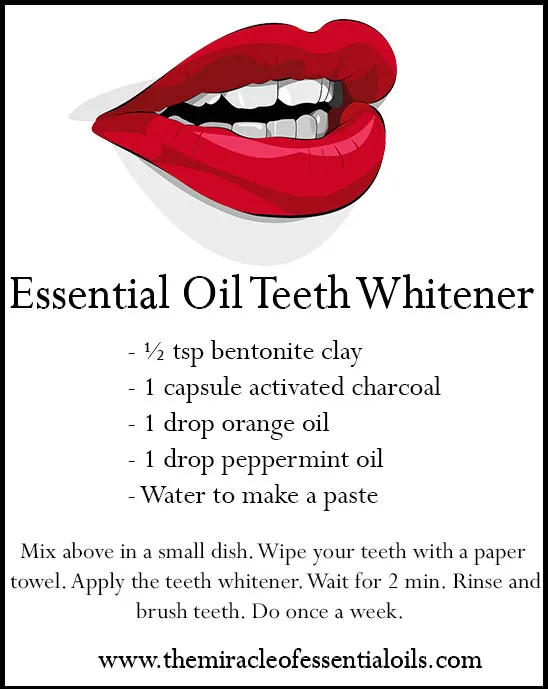
Gathering the right ingredients is the first step towards creating a successful essential oil teeth whitening recipe. You will need the following essential oils: lemon, peppermint, tea tree, orange, frankincense, myrrh, or clove. A high-quality carrier oil, such as coconut oil, is essential to dilute the essential oils and make the mixture gentle on your teeth and gums. Consider adding a mild abrasive agent, such as baking soda, to boost stain removal. A small glass jar or container with a tight-fitting lid is important for storing your prepared recipe. To keep the recipe at its best, make sure your chosen ingredients are fresh. Having the right ingredients ready guarantees you can start making your DIY teeth whitening solution right away.
Step-by-Step Recipe
Follow these steps to create your own essential oil teeth whitening recipe, but always do your research and consult with a dentist if you are unsure: In a clean glass jar, mix 1-2 tablespoons of carrier oil, like coconut oil. Add 2-3 drops of lemon or orange essential oil, for whitening, 1-2 drops of peppermint essential oil, and 1 drop of tea tree oil. Stir well to mix the ingredients. Add a small amount of baking soda (optional), mixing well for additional stain removal. Seal the jar tightly and store the mixture in a cool, dark place. Using this recipe, you can tailor it according to your needs. This method is a great way to take advantage of essential oils and will give you a great start.
How to Use and Apply the Recipe
Using your essential oil teeth whitening recipe properly is essential to achieve the best results. Start by brushing your teeth with the mixture as you would normally do with toothpaste. Allow the mixture to stay on your teeth for one to two minutes, gently brushing in circular motions. After brushing, rinse your mouth thoroughly with water to remove any residue. You may also rinse with a solution of water and a few drops of your preferred essential oil, such as peppermint oil, to freshen breath. Repeat this process once or twice daily for up to a week, then reduce the frequency to a few times per week. Remember to be gentle and avoid excessive pressure to prevent enamel damage. Consistent and correct use of the recipe can support brighter, healthier teeth.
Precautions and Safety Tips
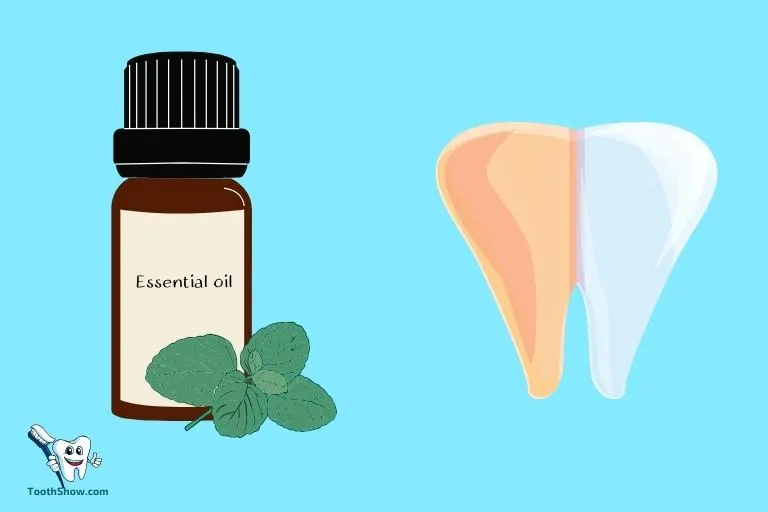
When using essential oils for teeth whitening, it is important to prioritize safety. Always dilute essential oils properly with a carrier oil to prevent irritation or adverse reactions. Do a patch test on a small area of skin before applying the mixture to your teeth to check for allergies. Avoid swallowing the essential oil mixture, as some oils can be toxic if ingested. Consult with your dentist or a qualified aromatherapist before starting any new oral care routine, especially if you have any underlying health conditions. Be especially careful if you have sensitive teeth, as some essential oils can cause increased sensitivity. If you experience any discomfort or adverse reactions, stop use immediately and consult your dentist. Taking these precautions will keep your teeth and mouth safe.
Potential Side Effects
Like any treatment, using essential oils for teeth whitening can have potential side effects. Some people may experience increased tooth sensitivity, particularly if they use acidic essential oils like lemon or orange oil. Irritation of the gums or soft tissues in the mouth is another possible side effect, especially if the essential oils are not properly diluted. Allergic reactions are rare but possible, so it’s important to perform a patch test before using any new essential oil. In some cases, excessive use of essential oils might damage the tooth enamel over time. If you experience any of these side effects, discontinue use immediately and consult your dentist. Knowing the potential side effects allows you to make informed decisions.
Consulting with a Dentist
Before using essential oils for teeth whitening, consult with your dentist. Your dentist can assess your oral health and provide personalized advice based on your specific needs. They can inform you about potential risks and benefits specific to your dental condition and overall health. They can also help identify any existing dental issues that may affect your suitability for this treatment. Regular dental check-ups are essential, and your dentist can monitor your progress and provide guidance on the best practices. Your dentist’s professional opinion can guarantee that your teeth whitening efforts are safe and effective. Combining essential oils with a regular dental check-up is an effective way to achieve the results you want.
Maintaining Your White Smile

Maintaining your bright, white smile requires a consistent and comprehensive approach. Continue to practice regular oral hygiene, including brushing your teeth twice daily and flossing once a day. Limit your consumption of teeth-staining foods and drinks, such as coffee, tea, and red wine. Schedule regular dental check-ups and professional cleanings to remove plaque and stains. Consider using your essential oil teeth whitening recipe a few times per week to maintain your results. Using products designed to protect your tooth enamel will help maintain the color and strength of your teeth. Avoid smoking or using tobacco products, as these can cause significant tooth discoloration. With consistent care and the right habits, you can enjoy a bright and healthy smile for a long time.
